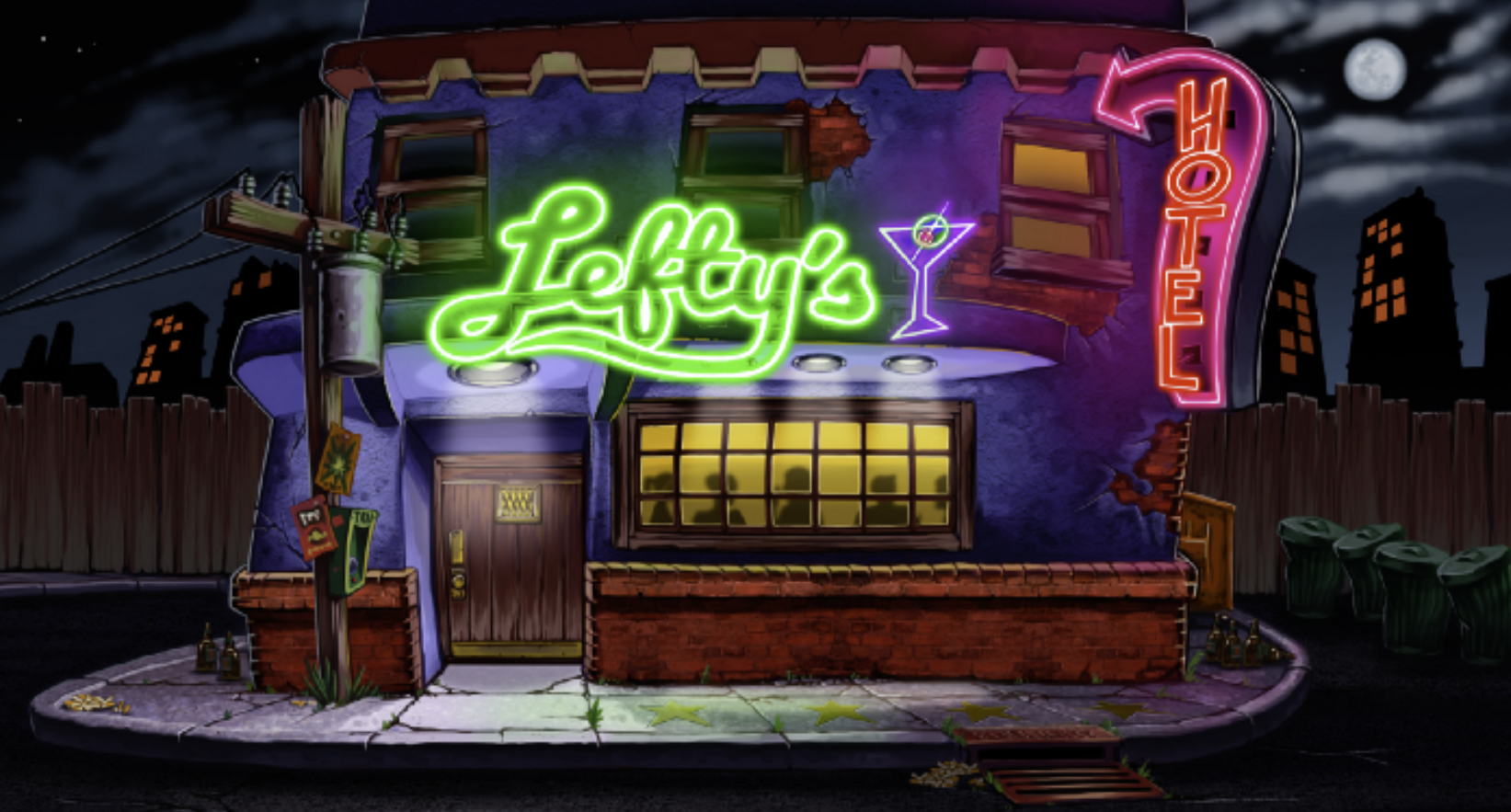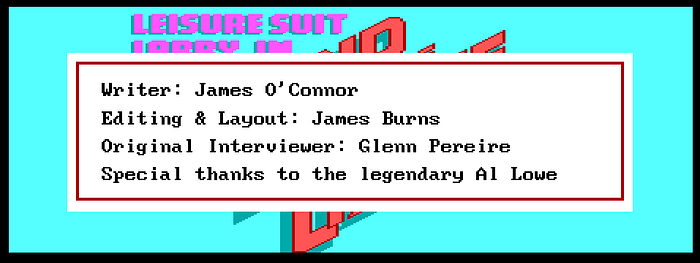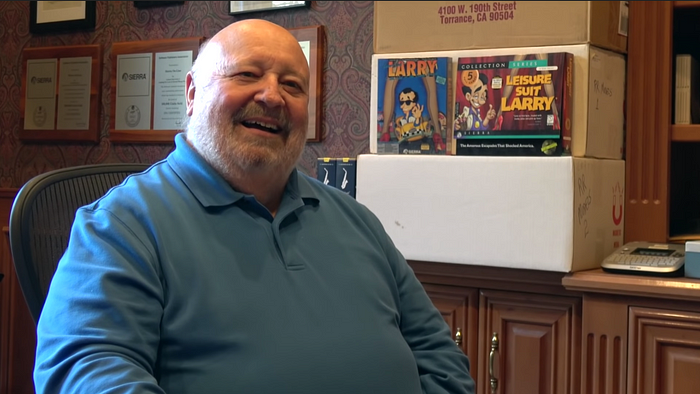Al Lowe Reflects on Leisure Suit Larry
An exclusive interview with the father of raunchy video game comedy


For many young players, the highlight of the original Leisure Suit Larry game (Leisure Suit Larry in the Land of the Lounge Lizards, first released in 1987, then remade in 1991 and 2013) wasn’t the puzzles, or the plot, or even the bawdy humour the game was going for. The best part of the game was the moment where it became playable at all. Leisure Suit Larry age-gated its content by asking players to complete a quiz to prove that they weren’t children trying to get into a game aimed at an older age bracket. This mean, of course, that a lot of children had to guess their way into it — a transgressive thrill for anyone under a certain age.
Even today, some of the answers might require some guess work: ‘Herb Alpert and the ____ Brass?’ (Tijuana); ‘Charlie McArthy and…’ (Edgar Bergan); ‘Who has not been a US attorney general?’ (Sam Shepard). Still others were a bit cheeky: is O.J. Simpson A) an R & B singer, B) under indictment, C) embarrassed by his first name (Olivia) or D) no one to fool with?
(The answer was D.)
Leisure Suit Larry in the Land of the Lounge Lizards was an image-and-text based adventure game about Larry, the eponymous lounge lizard (a slang term for a lounge musician), who sets out to lose his virginity one night in Vegas. It’s a racy game — the sort of game where you can die from an STD early on from having unprotected intercourse with a sex worker, and, in the first remake, a game that can end with Larry committing suicide if you don’t complete it in time. There are elements of it which have not aged well, as with most adventure games from the 1980s, but it’s still a significant game. It’s one of the earliest examples of a successful comedy game, and its development and creation were unique in many ways.

From teaching to coding
Al Lowe, the game’s lead designer, taught himself programming and coding at the age of 35 while home sick from his job as a teacher. “In America, teaching is just about the most stable profession there is,” Lowe says. “You can’t be fired without really heavy problems.” Still, at that time, Lowe found himself in a position where he could plausibly try to start up a new career. “It was very secure, but I was lucky in that I had a wife who was also a teacher. We lived conservatively, so we decided we could live off her salary while I pursued a new career, and that’s what we did. We just cut back our expenses as much as we could. It helped that I got a leave of absence from the school, so that I could return.” Lowe, who never returned to teaching, has his wife to thank for his career in development. “It is tough to make a career change like that. I was lucky in that I had a wife and we had lived conservatively. We had savings, and so we could make that move.”
“My goal at the time was to not wear a tie to work every day,” Lowe recalls. “The goal was to not leave home, to just work at home and telecommute. Nobody knew that phrase in 1980, but I had a 300 Baud Hayes modem. Why would you need to leave the house?” Lowe spent $300 on that modem, and recalls being ashamed at having spent so much, and wanting to keep it a secret from his wife. “It was very expensive and there was nobody to call.”
Leisure Suit Larry in the Land of the Lounge Lizards was the eighth game Lowe worked on. Between 1982 and 1986 he was credited on several games with a very different tone from the series that would eventually make him a big name. He designed Winnie the Pooh in the Hundred Acre Wood, Mickey’s Space Adventure, Donald Duck’s Playground and The Black Cauldron: Disney licensed titles, which were obviously aimed at a much younger audience. But when Sierra lost the Disney license, studio co-founder Ken Williams asked him “to do a modern version of Softporn Adventure”, a 1981 text adventure game about…well, gettin’ laid.
The game, which has its own fascinating history, was “so out of touch” by the late ‘80s, Lowe says. “The only way I could do another version of it would be if you let me make fun of it. I think I could mock it and make people laugh at it, but it’s just not serious. It’s not a serious game.” Williams agreed, and Lowe, now in his 40s, got to work.
“Most guys who were writing games back then were early 20s, maybe mid-20s,” he recalls. “I was 35, 40. My initial feeling was ‘oh, I’m too late. I’m over the hill. I can’t be successful in this business, because I don’t have a background in Math or Computer Science.’”
“I thought, ‘I’m at a real disadvantage in this business,’ but I was wrong. I was at an advantage, because I had life experience and I had a background in the humanities. I had a background in public speaking, in show business. I was a professional conductor of musicals. I used to direct the pit orchestra for musicals, and so I understood staging and blocking and character development and plot lines. A lot of young guys that were math majors or computer geeks, they didn’t really have that stuff. It turned out that I was in the right field after all.”

Video games as comedy
Lowe set out to make a game that was, first and foremost, a comedy. “There were a couple of games that I had played that had a few smiles in them, but no game really build itself as a comedy,” he says. “It was a scary proposition. I wasn’t sure what people would laugh at. I just threw in everything I thought somebody might find funny, and so there’s a lot of things in there. I’m sure there’s a lot of things that people don’t find funny.” Even now, games that bill themselves as ‘comedies’ are rare, with genre distinctions typically focusing entirely on the method of play. Leisure Suit Larry is an adventure game, where you solve puzzles and collect items to progress, but its main purpose was always to amuse.
The game was written in three months, and then beta tested for another three. “They didn’t think it was a good time to ship it, so we ended up going into beta testing”, Lowe recalls. “As far as I know, that was the first beta tested game. Nobody that I knew of had ever heard of it, beta tested things.” Testers were recruited from a CompuServe games forum. “I put up a message [that] said, ‘if you’d like to beta test a game, send me an email in 50 words or less why I should choose you to beta test a new comedy game from Sierra.’ I got a lot of responses, and we picked about the 12 most funny, the 12 most creative people.”
This was a good fit, Lowe says, because at the time adventure games could often be too abstract, with the absence of a hint system making the game all but impossible to finish if you didn’t already know exactly what you were doing. Putting the game in the hands of testers allowed him to see that the game, with its heavy text interface, made sense to players. “I wasn’t very confident that I knew how to write a game with typing and a parser”, Lowe admits.
“I put up a message [that] said, ‘if you’d like to beta test a game, send me an email in 50 words or less why I should choose you to beta test a new comedy game from Sierra.’ I got a lot of responses, and we picked about the 12 most funny, the 12 most creative people.”
Leisure Suit Larry would go on to be a slow-burn success, selling poorly at release — the lowest sales in Sierra’s history, in fact, with just 4000 copies shifting in the first month, thanks in no small part to a lack of advertising and reviews. Lowe was upset, even though he’d known the game was a risk. “I got a much higher royalty rate than I had on other things and he didn’t have to give me any money upfront”, he says. “I had no assurance that I would see any money from it.”
But the game’s sales doubled month on month, and it eventually grew into a hit. “It was a viral sensation before anybody knew what the word viral meant in software”, Lowe says. The game was also, Lowe suspects, pirated extremely heavily — bad for business, but good for awareness and word-of-mouth. “We actually sold as many hint books as we sold games,” he recalls.
Lowe is clearly proud, and holds a lot of affection, for the character and world he created. “I wanted a character that I could easily make fun off and mock and make jokes at and so forth, but at a certain point you have to have a sense of sympathy for him. People want to care about the protagonist in the game even though he is an antihero, you still want to. The other big problem was, if I made him too distasteful, why would any woman even consider going out with him? That was always the trouble was like well, wait why do these, what do these women see in this guy?”
“It was a viral sensation before anybody knew what the word viral meant in software.”
Before he left Sierra in February 1999, Lowe would serve as designer on seven Leisure Suit Larry games, as well as the director on the remake of the original on the SCI engine. This included the original, five direct sequels, and a casino spin-off. The later titles in the series — Magna Cum Laude (dire), Box Office Bust (a travesty) and last year’s Wet Dreams Don’t Dry (apparently, surprisingly, quite good) — were all made without Lowe’s involvement.

Larry’s legacy
But he returned for Leisure Suit Larry: Reloaded, a 2013 remake for PC, iPad and iPhone. “We added five times the number of lines of jokes and stuff”, Lowe says. “It’s five times bigger than it was, and we added another woman and a lot more puzzles. You’ll know some of the game and then some of the game will be fresh to you, because we wrote it for that Reloaded.”
In the modern day, the adventure game has made something of a comeback. But the modern adventure games are more clearly inspired by the ‘90s Lucasarts adventures, and titles like Broken Sword and Gabriel Knight, than the Sierra games of the ‘80s. “I think a lot of people don’t enjoy those things, that’s the problem,” Lowe posits. “A lot of people don’t like sitting and reading and thinking and puzzling and being mentally challenged. To me, shooter games are boring, because it’s all the same thing over and over again. Yeah, you can see the bad guy explode in a bunch of different ways, but so what. It’s not mentally satisfying.”
These days, Lowe isn’t invested in games in the same way — he hasn’t been involved in a game’s development since Reloaded. He’s also not finding many games that he wants to play. “If somebody said, ‘hey, there’s a great funny game out and you’ll laugh your ass off,’ I would buy it,” he says. “But I’m not into just shooting monsters. I didn’t get into any of the Sims games, I thought those were boring. I was never into RPGs either. I keep thinking, ‘I must not understand this properly. This is not very much fun,’ and then I talk to people, they say, ‘no, that’s it, you’re doing everything the way you’re meant to.’”
“We appealed to a small fraction, a small percentage of the population back in the ‘80s and ‘90s. I don’t see that number as having grown. I think we still appeal to those same people, but it’s the kind of people that read games magazine or they play chess. It’s never going to be a mass market sort of success story.”

Call me Al
These days, Lowe says, he spends a lot of time corresponding with fans of his work. “Back then all of us were working so hard that we didn’t really have time to contemplate our success nor to receive any feedback from people,” he reminisces. “Sierra may have gotten mail from people, but we never really saw it.” These days, fans contact him through his personal website, allowe.com. Since starting the site, he has received emails from “literally hundreds of thousands of people.”
Now retired, Lowe enjoys his correspondence. “I’ve answered over 80,000 that I know of, and I’m sure I’ve answered more than that,” Lowe says. “I stopped counting 10 years ago. I get emails everyday still, after 20 years.”
“I feel like anybody who bought the game has helped in a small way to give me a good retirement and I’m happy to respond. It wasn’t until I started getting emails that I realized just how many lives I had touched. That those numbers on the spreadsheets we used to have to work on — it added up to millions of copies of games. Somehow it didn’t sink into me that each one of those numbers, they meant that somebody was sitting for a dozen, two dozen, three dozen hours working out all those puzzles that we put in there. Laughing at my jokes and building up a sense of storyline and a connection to the character.”
“I’ve answered over 80,000 [emails/letters] that I know of, and I’m sure I’ve answered more than that.”
When Lowe built the website initially, he didn’t include an option to contact him, as he was afraid of being bombarded with spam. “Somewhere I was reading some geeky thing and it said, ‘Oh you could put a JavaScript. Use JavaScript to disguise your email address so that the spiders can’t find it.’ I used a little JavaScript routine to append a bunch of stuff and did some ASCII codes and there was some weirdness. But I put the link up for the email, and I’m so glad that I did, because that’s really been a joy to me over the last 20 years to read all those letters from people.” Lowe has been surprised at the impact his series has had on people’s lives. “A lot of times it’s just people who say thank you for the games and stuff, but a lot often times I getting thousand times maybe people have said, ‘Oh yeah, you really affected my relationship with my dad or my brother or my mom was dying of cancer and I needed something to make me smile,’ and just really touching things that you go, ‘Shit! I had no idea I was doing that.’”

Al Lowe, now in his 70s — having felt like he was too old to get into games half a lifetime ago — is happy with the impact his work has had, and the goodwill he’s received from his fans. “I was trying to make people laugh, but instead it turned out to have affected their lives. It’s a good feeling.”
This piece is based on an original interview conducted by Glenn Pereire in 2017.Glenn is the founder of Pixel Crib, a boutique store specialising in video game memorabilia and collectibles. Please check them out!
